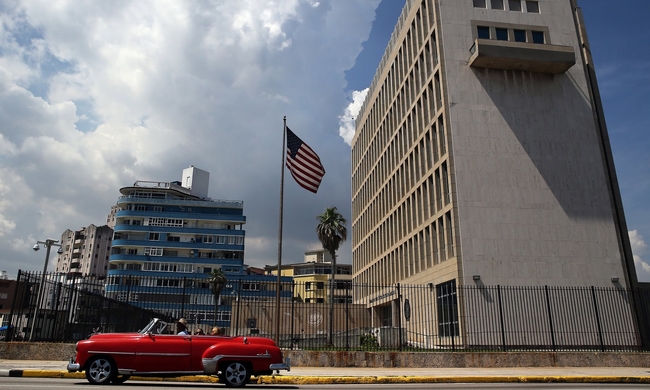Cuban 'acoustic attack' report on US diplomats flawed, say neurologists
The Guardian | Tuesday, 14 August 2018 | Click here for original article

Tests stating staff suffered brain damage were ‘misinterpreted’ and ruled out other explanations such as mass psychogenic illness
Claims that US diplomats suffered mysterious brain injuries after being targeted with a secret weapon in Cuba have been challenged by neurologists and other brain specialists.
A medical report commissioned by the US government, published in March, found that staff at the US embassy in Havana suffered concussion-like brain damage after hearing strange noises in homes and hotels, but doctors from the US, the UK and Germany have contested the conclusions.
In four separate letters to the Journal of the American Medical Association, which published the original medical study, groups of doctors specialising in neurology, neuropsychiatry and neuropsychology described what they believed were major flaws in the study.
Among the criticisms, published on Tuesday, are that the University of Pennsylvania team which assessed the diplomats misinterpreted test results, overlooked common disorders that might have made the workers feel sick, or dismissed psychological explanations for their symptoms. Doctors at the University of Pennsylvania defended their report in a formal response in the journal, but the specialists told the Guardian they stood by their criticisms.
The US withdrew more than half of its Havana diplomats last year and expelled 15 Cubans after 24 embassy staff and family reported a bizarre list of symptoms, ranging from headaches, dizziness and difficulties in sleeping, to problems with concentration, balance, vision and hearing. Many said their symptoms developed after they heard strange noises, described as cicada-like chirps, grinding, or the buffeting caused by an open window in the car.
The accounts led Washington to claim the diplomats had been victims of “acoustic attacks”, though an FBI investigation found no evidence that sonic weapons were involved. Physicists have voiced doubts that such weapons were even feasible.
At the request of the US government, doctors at the University of Pennsylvania ran checks on 21 diplomats and investigated six with a further 37 tests. Led by Doug Smith, the director of the university’s centre for brain injury, the team concluded that the patients had concussion-like injuries caused by damage to “widespread brain networks”. The state department now cites the medical report on its travel advice pages and urges people to reconsider visiting Cuba.
The doctors who contacted the journal disagreed with the diagnosis. Robert Shura, a board-certified clinical neuropsychologist at Salisbury veterans affairs medical centre in North Carolina, and two colleagues, said Smith’s team had misinterpreted cognitive tests performed on the diplomats.
It is standard practice to compare people’s scores on such tests with others in the population. A score in the bottom 5% would typically mean there is a problem. But Shura pointed out that the diplomats were found to be “impaired” if they scored in the bottom 40% in any one of the tests. In their letter, the doctors said it was “inappropriate” to conclude that any of the patients were impaired. “It is more likely than not that all six of the patients whose data are reported had normal neuropsychological profiles,” Shura told the Guardian. Other specialists have published the same criticism.
In another letter, doctors including Gerard Gianoli from the Ear and Balance Institute in Louisiana argued that the test results pointed to inner ear damage rather than concussion and called for more thorough testing. “Given that almost all of the patients complained of hearing loss and balance problems, I am extremely suspicious of an inner ear insult in this group of patients,” Gianoli said. “I do wish they would be more thoroughly evaluated.”
In a third letter to the journal, Jon Stone, a consultant neurologist, and Alan Carson, a consultant neuropsychiatrist, both at the University of Edinburgh, argue with Stoyan Popkirov, a neurologist in Bochum, that Smith’s team too easily dismissed so-called functional neurological disorders. These can be triggered by sudden noises which, combined with anxiety and heightened attention, lead to real and persistent neurological problems.
One such disorder is the “acoustic shock” that affects telephone operators who hear sudden loud noises in their headsets. “Functional neurological disorders are common genuine disorders that can affect anyone, including hardworking diplomatic staff,” the doctors wrote.
In a further letter, Robert Bartholomew, an Auckland-based expert on mass psychogenic illness, argued that Smith’s team failed to rule out a psychological explanation for the sickness affecting the diplomats. Mass psychogenic illness arises in stressful situations, but can start slowly and last for months and years, he wrote, and often features neurological symptoms. “There are several cases in the annals of mass psychogenic illness that parallel the audio perceptions and symptoms reported in the Cuban embassy subjects,” he said.
In response, the University of Pennsylvania team stood by their report, adding that they did not have room to give full details of every test they performed. More brain scans are underway in the hope that the images will “identify structural brain changes that may underlie the neurological manifestations”, they wrote. Smith did not respond to a request for comment.






